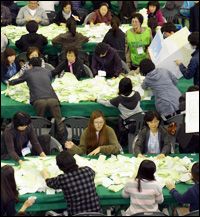Unique election system is product of history

Employees of the National Election Commission (NEC) count votes after the parliamentary elections on April 11 at the gym of Gyeonggi Commercial High School in downtown Seoul, one of the city’s designated vote-counting locations. / Korea Times photo by Kim Joo-sung
With just five free presidential elections under its belt, Korea is still a young democracy. The struggles experienced over free speech and citizen empowerment during the past decades as the nation detached itself from dictatorship have shaped a unique set of election laws and a system that is dependable but perhaps somewhat overcompensating.
Korea is one of many countries that operate independent committees to manage elections, a list that includes the United States, Japan, Canada, Germany, Britain, Spain and more. But while the agencies in most of these countries are part of their administrative systems, Korea along with the Philippines, India and El Salvador are the only countries that designate their election bodies as constitutional organizations.
Korea is also home to one of the toughest regulations on election campaigning: Candidates are issued strict timetables to be followed when promoting themselves and are given limited choices regarding how they may do so, with any activities beyond these boundaries deemed as unlawful.
While many nations have voting systems in which they count ballots at polling stations, Korea is among the group of countries that totalize votes cast from multiple locations at a central point.
On every polling day this prompts the drama of heavily-guarded police vehicles conveying the collected ballots to counting locations under security measures tight enough to transport Hannibal Lecter. The counting stations are even equipped with their own electricity generators, preventing the possibility of power outages and associated fishy behavior that can happen in the dark.
Japan, Britain, Australia, Belgium, Norway and Ireland are others on the limited list of countries that have centralized vote counting systems, according to officials from Korea’s National Election Commission (NEC).
“The number of countries with constitutionally independent election bodies becomes even shorter when considering that the current agency in the Philippines is temporary and will be changed,’’ according to an NEC official, on condition of anonymity.
“The larger number of developed democratic states, including the United States and most European countries, don’t limit the activities of candidates to within a designated campaigning period, and aside from a very few exceptions, provide no restrictions regarding the methods through which they can promote themselves. Aside from Korea, Japan, France, Italy, Spain, Brazil and the Philippines are all countries that issue campaign timetables to candidates, but that’s about it.
He admitted that the centralized vote counting seems less efficient and more cost-consuming than counting votes directly at polling stations, but said there has been no real discussion within the NEC or proposals from politicians to change the system.
“I guess the countries that employ centralized vote counting each have their own reasons and even within these nations our rules are among the strictest because even details such as the actual location of vote-counting locations are written in law. Obviously, security and control are factors as nobody wants to think about the worst-case scenarios that could happen during a vote count. I think we have always done things this way and we have yet to see any effort to change the law on this,’’ he said.
It could be argued that Korea’s voting regulations and systems are products of history, dating back to the troubling days of Syngman Rhee, whose accomplishments as an independence activist were tarnished by political repression and corruption during his term as the country’s first president.
Rhee authored his exit from the presidency in 1960 by orchestrating a fraudulent election designed to put his confidant, Lee Gi-bung, into power. His government apparently pulled every trick in the vote-rigging book, including intimidation of voters, switching ballot boxes and inflating counts. This triggered nationwide protests that forced Rhee to resign and spend the rest of his life in exile in Hawaii.
The democratic government that followed Rhee’s ousting was short-lived and gave way to a succession of military regimes led by the late Park Chung-hee, who happens to be the father of Saenuri Party presidential candidate Park Geun-hye, and Chun Doo-hwan. It was not until 1987 that military rulers conceded to public demand and allowed a constitutional amendment for a free presidential election.
It’s understandable that the NEC was then designated as a constitutional organization after years of witnessing its autonomy compromised by a succession of governments. And perhaps this also explains the sentiment of politicians and voting officials who aren’t comfortable talking about counting votes independently at poll stations. <The Korea Times/Kim Tong-hyung>

























































